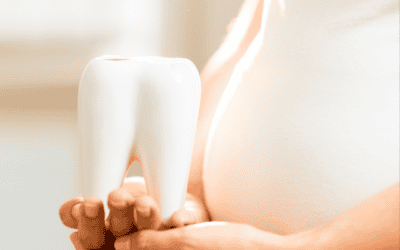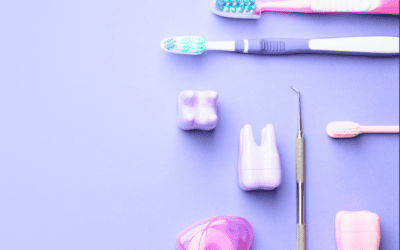For many people, a trip to the dentist is a routine part of life. However, for others, the very thought of sitting in the dentist’s chair triggers intense feelings of fear and anxiety. Dental anxiety or dental phobia is a real, psychological condition that can have a significant impact on a person’s ability to maintain their oral health. While it’s common for people to feel uneasy about dental visits, some individuals experience overwhelming fear that can prevent them from seeking necessary treatment altogether.
What is Dental Anxiety and Dental Phobia?
Dental anxiety refers to a general sense of unease or nervousness about visiting the dentist. This might occur in anticipation of a routine checkup or a specific procedure.
Dental phobia, on the other hand, is a more severe and intense fear of dental visits. It goes beyond simple anxiety and can result in panic attacks or complete avoidance of dental care.
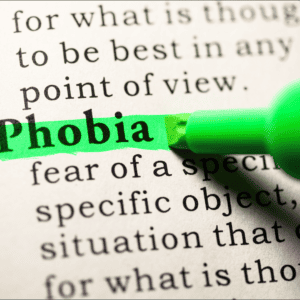
Why Do Some People Experience Dental Anxiety or Phobia?
Several psychological, emotional, and environmental factors can contribute to the development of dental anxiety and phobia. Understanding these underlying causes is key to managing and overcoming dental fear.
- Past Negative Experiences
A traumatic or painful experience at the dentist, especially during childhood, can leave lasting emotional scars. For example, a painful procedure, a dentist who wasn’t kind, or even a bad experience with a dental tool (like the sound of the drill). These can create a strong association between fear and dental visits.
- Fear of Pain or Discomfort
The fear of pain is one of the most common reasons people avoid dental visits. Many people associate dental procedures with discomfort, even if modern dentistry has made significant advances in pain management. However, the anticipation of pain can be enough to trigger anxiety.

- Loss of Control
Dental procedures often require patients to lie back in a chair for an extended period, which can trigger feelings of helplessness and loss of control. For some individuals, not being able to speak or move freely while someone works in their mouth can be unsettling.
- Fear of Embarrassment or Judgment
For some, dental anxiety stems from a fear of judgment, especially if they feel self-conscious about the state of their teeth or gums. They may be embarrassed by poor oral hygiene or worried about the consequences of neglecting their dental health.
- Generalized Anxiety or Phobias
People with a history of generalized anxiety disorder (GAD) or other phobias (such as claustrophobia) may be more susceptible to developing dental anxiety. The symptoms of these conditions—such as heightened fear, worry, and panic—can exacerbate the experience of dental visits, even when the treatment itself is relatively minor.
How Can Individuals Cope with Dental Anxiety and Phobia?
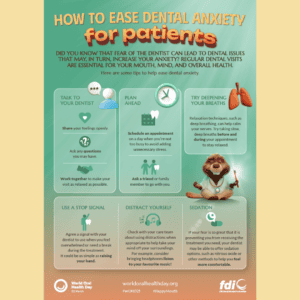
The above infographic is from the fdi’s World Oral Health Day campaign – A happy mouth is a happy mind.
Fortunately, there are effective strategies that individuals can use to manage and overcome dental anxiety or phobia. The key is finding techniques that work for you to help reduce stress and make dental visits more tolerable.
- Practice Relaxation Techniques
Learning relaxation techniques like deep breathing, meditation, or progressive muscle relaxation can help calm the mind and body before and during a dental visit. Simple breathing exercises—such as box breathing—can trigger the body’s relaxation response, helping to reduce anxiety.
- Exposure Therapy
Exposure therapy is a technique that involves slowly and systematically desensitizing an individual to their fear. In the case of dental anxiety, this could involve making initial visits to the dentist for a consultation only or even just sitting in the dental chair. Over time, as the person becomes more accustomed to the environment, they can work their way up to having a full examination or treatment. This gradual exposure reduces fear and helps individuals gain confidence in managing their anxiety.
- Communication and Support
Talking openly with your dentist about your fears and anxieties is an essential step toward overcoming dental phobia. By being transparent about your feelings, you give the dentist the opportunity to offer support and accommodations that can help reduce your stress.

How We Help Patients with Dental Anxiety
At Dentistry on George, we are well aware of the psychological barriers that dental anxiety and phobia can create for patients. As such, we are well equipped to help individuals with dental anxiety, making visits as comfortable and stress-free as possible.
- Creating a Relaxed Environment
We have designed our practice to be a quiet, welcoming and calming space. From our relaxing music and aromatherapy diffusers to our friendly staff who always help patients feel at ease, we understand that the atmosphere of our practice can go a long way in reducing anxiety levels before treatment even begins.
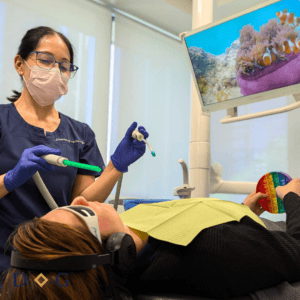
- Clear Communication and Gentle Care
Both Dr Kathryn and Dr Mishari will always explain procedures in detail, addressing any concerns our patients might have, and offering reassurance throughout the visit. We understand that a dentist who listens to their patient’s concerns and goes at their pace can make a world of difference in alleviating fear.
- Establishing a “Stop Signal”
For all of our patients, anxious or not, we have a “stop signal”. This allows our patients to signal to the dentist if they are feeling overwhelmed, providing them with a sense of control during the procedure. Knowing that they can stop at any time helps our patients feel more secure and less fearful.
- Sedation Options
For those with significant dental phobia, sedation may be an option. Dr Kathryn has additional training and can provide various sedation methods including medications, inhalation sedation and IV sedation, depending on what works best for the patient.
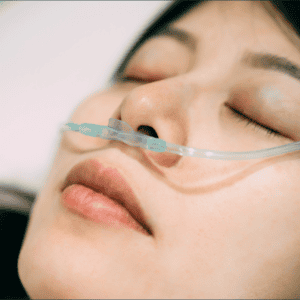
Conclusion
Dental anxiety and dental phobia are serious conditions that can prevent individuals from receiving the care they need to maintain good oral health. However, understanding the psychology behind these fears, along with effective coping strategies and with the support of our dentists, patients can overcome their anxieties and take control of their dental health. If you or someone you know struggles with dental anxiety, don’t hesitate to talk to us about options. We do all that we can to make your visits more comfortable. To find out more about what’s included in our new patient examination, click here.
This blog has been written by Sara – who completed her psychology degree in 2023.


